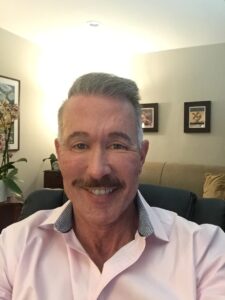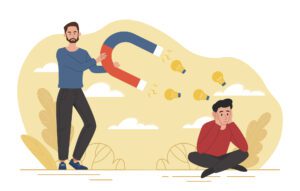 Gay Executive Coaching and The Dark Side of Ambition:
Gay Executive Coaching and The Dark Side of Ambition:
Navigating Toxic Competition in the Workplace
I primarily serve as a licensed psychotherapist in California who has specialized in working with gay men as individuals or in relationships for over 32 years now in 2025. I’m also a nationally Certified AASECT Sex Therapist, and retired graduate school professor. But I also do quite a bit of Coaching for gay men – life, relationship, sexual education and empowerment, financial, career, and executive – for gay men in the United States and all over the world.
In my role as an Executive Coach for gay men, I support helping guys achieve the balance between the intrinsic rewards of doing work that you love with the extrinsic rewards of making a good living economically, what I like to call “making a living, while making a difference.”
Gay male executives work with me on a number of topics, such as clarifying professional values, short-term and long-term career trajectory, self-care, staff relations, boundaries, conflict resolutions, motivating the self and others, and work/life balance.
Another topic is navigating what is usually a very competitive economic market. No matter what field you’re in, you’re making your contributions while usually a competing person or organization is making theirs, and while Abundance Thinking dictates that there is “enough to go around,” we only need to look at the world-famous rivalry between Coke and Pepsi to have an illustration that competition is a fact of life in the global economy, for whatever market share, in that case the beverage-consuming public.
In most countries, but especially pronounced in the United States as a value system, ambition and competition are often heralded as key drivers of success in the business world. For gay men in professional spaces, these dynamics are layered with unique challenges, shaped by societal expectations, internalized biases, and cultural narratives around masculinity and success. While healthy competition can inspire innovation and excellence, raising the bar in any field, it can also become toxic, leading to fractured relationships, underhanded tactics, and mistrust, which can contribute to stress and burnout.
Drawing on my experience as a therapist, executive coach, and career counselor specializing in gay men’s professional issues, I’ve seen firsthand how toxic competition can impact careers, businesses, and mental health. Additionally, my background includes ten years as an executive in the non-profit sector, specializing in AIDS service organizations and mental health. I’ve worked in the private, public, and non-profit sectors, gaining a diverse perspective on organizational structures and dynamics. Before transitioning to full-time private practice, I was also an adjunct associate professor at the University of Southern California (USC) Suzanne Dworak-Peck School of Social Work, teaching courses on leadership, psychotherapy techniques, couples therapy, coaching, mental health, and LGBTQ+ issues. These varied experiences inform my approach to coaching and therapy, allowing me to offer practical strategies rooted in long-term, real-world expertise.
Today’s discussion explores how toxic competition manifests, its consequences, and strategies for building healthier, more collaborative professional environments. Executive coaching, in particular,offers powerful tools to address these challenges and transform professional lives.
The Role of Executive Coaching in Transforming Professional Dynamics
Executive coaching provides a structured, individualized approach to address the unique challenges gay men face in professional settings. It goes beyond resolving conflicts—it empowers clients to develop strategies for growth, collaboration, and resilience. Here are some core areas where coaching makes a significant impact:
- Navigating Workplace Biases and Challenges
Gay men often encounter stereotypes in the workplace, such as being perceived as “soft” or lacking the traditional masculinity often associated with key leadership roles. These biases can lead to being overlooked for promotions, excluded from key projects, not given voice in group projects, or not being taken seriously in high-stakes discussions, especially about finance or staffing. Such stereotypes not only undermine professional opportunities but also reinforce systemic barriers to leadership. Gay men can often face barriers and “glass ceiling” dynamics that we more often hear about women raising as concerns.
Through coaching, I help clients address these challenges by:
- Identifying and addressing systemic biases in their workplaces.
- Developing assertiveness skills to advocate for their qualifications and leadership potential.
- Building resilience to counteract the negative effects of workplace stereotypes.
By fostering self-confidence and strategic thinking, coaching equips gay men to thrive despite these obstacles.
- Embracing Authenticity
One of the greatest challenges for gay male professionals is balancing the need to conform to workplace norms with the desire to be authentic. Studies have shown that hiding one’s sexual orientation, or “covering,” can lead to diminished job satisfaction and increased psychological distress (Ragins et al., 2007). Conversely, authenticity—rooted in personal values and strengths—leads to higher levels of engagement and career satisfaction.
Coaching sessions often focus on:
- Helping you define your core values and align your career with these principles.
- Building communication skills to share your authentic self effectively.
- Exploring ways to balance authenticity with professional image management.
By embracing their authentic selves, gay men can break free from toxic competition and instead build careers that reflect their individuality, their talents and contributions.
- Developing Emotional Intelligence
Emotional intelligence (EI) refers to the ability to recognize, understand, and manage your own emotions while effectively navigating and influencing the emotions of others. In the workplace, EI is essential for building strong relationships, resolving conflicts, and fostering a collaborative and productive environment. Research by Goleman (1998) indicates that EI is a stronger predictor of success than IQ or technical expertise, particularly in leadership roles. For gay men, who may face additional stressors related to identity, EI can be transformative. Emotional intelligence (EI) is a critical skill for navigating workplace dynamics. Research by Goleman (1998) indicates that EI is a stronger predictor of success than IQ or technical expertise, particularly in leadership roles. For gay men, who may face additional stressors related to identity, EI can be transformative.
In coaching, we focus on developing EI through:
- Self-awareness: Understanding personal triggers and emotional patterns that tend to be consistent over a career in any number of job roles.
- Empathy: Building stronger relationships by understanding others’ perspectives, validating other points of view but also negotiating boundaries and wielding influence.
- Effective communication: Learning how to navigate conflicts and advocate for one’s needs, both at the individual professional role level, your department or organizational section level, and on your work/life balance personal level.
Developing EI not only enhances professional performance but also strengthens interpersonal relationships.
- Cultivating Leadership Skills
Leadership often requires navigating complex team dynamics, managing diverse personalities (I have written before in a three-part series of articles about how psychiatrically diagnosable Personality Disorders can manifest in the workplace; see Blog at GayTherapyLA.com for those) and fostering collaboration, while also demonstrating leadership in making, cutting, and changing both staff and financial resources. For gay men, stepping into leadership roles may feel particularly daunting in environments that have historically excluded LGBTQ+ voices or voices of other minority groups (women, BIPOC, etc.).
Coaching helps clients:
- Identify their leadership style and strengths.
- Build confidence to take on high-visibility roles.
- Develop strategies for inclusive leadership that fosters team cohesion.
Leadership coaching also emphasizes ethical practices, ensuring that clients model the collaborative and respectful behaviors they wish to see from their team members.
- Reframing Competition as Inspiration
While competition can become toxic, it can also serve as a source of inspiration when approached with the right mindset. Healthy competition pushes professionals to innovate, refine their skills, embrace and apply new technologies, and achieve their full potential. The key is to focus on self-improvement rather than comparison.
Through executive coaching, I help clients shift their focus from “outperforming” others to excelling within their own goals, and their own Set of Values. This involves:
- Setting personalized career benchmarks based on individual aspirations.
- Celebrating milestones and achievements without minimizing others’ successes.
- Creating a vision for long-term growth that prioritizes personal fulfillment over external validation.
Underhanded Tactics in Gay Male Professional Spaces
Let’s examine some of the unfortunate, underhanded tactics I’ve either observed myself or had clients discuss with me. Let’s look at what these are, their impact, and their solutions. These are some of the most common, among others:
 Stealing Intellectual Property
Stealing Intellectual Property
In tight-knit professional communities, the free exchange of ideas—whether business strategies, creative concepts, or marketing innovations—is vital. However, this openness can sometimes lead to exploitation. Instances of intellectual property theft, such as appropriating a colleague’s business idea or creative work without acknowledgment, are common.
Impact: For gay professionals, whose networks often rely on trust and mutual support, this can erode relationships and discourage collaboration. It undermines the sense of community that is essential for resilience against broader societal discrimination.
Solution: Protect your ideas with contracts, copyrights, and agreements while fostering ethical practices. Coaching sessions often include guidance on setting boundaries and safeguarding intellectual property.
- Taking Credit for Others’ Work
In fields where visibility is paramount—such as media, marketing, or the arts—it can be tempting for some to claim credit for others’ contributions to gain recognition in the eyes of the consumer public.
Impact: This behavior can lead to resentment, diminished collaboration, and fractured networks in small, interconnected communities, such as in smaller towns/cities or in larger cities but in niche markets.
Solution: Foster transparency and mutual respect by clearly acknowledging contributions in all projects. My career counseling sessions often focus on teaching clients how to establish clear boundaries and effectively advocate for their contributions in group settings. Leadership coaching also emphasizes modeling ethical behavior to inspire trust and integrity within teams.
- Exaggerating Skills to Mimic a Competitor
Some gay men, particularly those newer to their fields, may feel pressured to “fake it till they make it.” This can lead to exaggerating experience or credentials to compete with more established professionals. While the intent may be to fit into spaces dominated by more seasoned peers, it often backfires when expertise is tested.
Impact: This behavior can alienate older or more experienced gay professionals, who may feel disrespected when their hard-earned expertise is downplayed. It also perpetuates a cycle of superficiality that undermines genuine growth and mentorship opportunities within the community.
Solution: Newer professionals should focus on highlighting their unique perspectives and willingness to learn rather than emulating others. Experienced professionals can help by fostering mentorship and supporting younger colleagues’ development, just as they probably received support from older professionals when they were young themselves.
-
 Stalking Competitors’ Moves
Stalking Competitors’ Moves
While competitive research is normal, excessive monitoring of peers—such as replicating marketing strategies, mimicking marketing content in ads or social media, plagiarizing website or direct mail content, or poaching clients—can cross ethical boundaries.
Impact: This fosters antagonism and undermines potential collaboration, turning allies into adversaries.
Solution: Collaboration often yields better results than rivalry. In coaching, I help clients transition from a scarcity mindset to an abundance mindset, recognizing that shared success often leads to greater opportunities for all.
- Pretending to Be More Experienced Than You Are
Some gay men may feel compelled to present themselves as more accomplished than they truly are, especially in industries where visibility, image, self-promotion, and shrewd public relations are critical. This often happens in an effort to gain credibility in spaces where they feel their identity or background might otherwise be a disadvantage. It’s often “form over substance.”
Impact: This tactic can alienate older gay professionals, who may feel their hard-earned experience is being dismissed by younger arrivals who “haven’t paid their dues” or cultivated skill sets and longevity/specificity of experience; they want to bypass a growth process and just land on top without earning the same credentials or efforts. It also creates a culture of distrust, where authenticity is replaced by performative competition.
Solution: Gay men in business should celebrate their unique journeys, whether as emerging professionals or seasoned experts. Highlighting authenticity and focusing on building genuine expertise fosters trust and long-term success.
 Generational Tensions Among Gay Professionals
Generational Tensions Among Gay Professionals
Another layer of toxic competition arises from generational divides. Younger gay men entering professional spaces may inadvertently disrespect older professionals by mimicking their ideas or branding without understanding the effort and expertise behind them. This lack of acknowledgment can feel dismissive to those who paved the way, creating unnecessary tension.
Impact: These dynamics discourage mentorship and collaboration between generations. Older professionals may feel undervalued, while younger ones miss out on the opportunity to learn from their predecessors, humbly, and then build on their legacy to move the industry/field forward.
Solution: Both generations can benefit from fostering mutual respect. Younger professionals should acknowledge the contributions of those who came before them, while older professionals can adapt by mentoring, welcoming, supporting, and incorporation new voices in the field, especially with new graduates who often have the benefit of learning fresh empirical research, modern school curricula, technology advances, and evolution of social attitudes and values.
Addressing Workplace Bullying
 Workplace bullying can significantly undermine the mental health, productivity, and career advancement of professionals, particularly in environments where power dynamics or identity-based biases are at play. For gay men, bullying often intersects with broader social stigmas, making it even more damaging and difficult to address.
Workplace bullying can significantly undermine the mental health, productivity, and career advancement of professionals, particularly in environments where power dynamics or identity-based biases are at play. For gay men, bullying often intersects with broader social stigmas, making it even more damaging and difficult to address.
Impact
Bullying behaviors can include verbal harassment, exclusion from team activities, undermining one’s credibility, or even overt hostility. Sexual or personal harassment is illegal for the perpetrator and for the perpetrators’ direct managers to allow. These actions create a toxic work environment that stifles collaboration, innovation, and personal growth, and could prompt legal actions for damages that can be catastrophic for an organization’s fiscal health. For gay male professionals, such behaviors may also trigger feelings of isolation and reinforce internalized biases, and reflect a long history of anti-gay antipathy in our histories in our families, schools, and communities, which can trigger strong psychological defenses.
Solutions
Through executive coaching, I help clients navigate workplace bullying by:
- Building Resilience: Developing emotional coping strategies to mitigate the psychological effects of bullying.
- Advocacy and Communication: Learning assertive communication techniques to address bullying directly and professionally.
- Establishing Boundaries: Identifying and enforcing clear personal and professional boundaries.
- Engaging Allies: Building networks of supportive colleagues and mentors to counteract the isolating effects of bullying.
- Referring, as needed, to legal resources to mitigate harm, contain perpetrator actions, and even pursue damages.
In addition to personal strategies, coaching also focuses on organizational advocacy, encouraging clients to work with HR or leadership to implement anti-bullying policies and foster inclusive workplace cultures. By addressing workplace bullying head-on, professionals can reclaim their sense of safety and focus on achieving their career goals.
How Coaching Can Help Break the Cycle
Toxic competition often stems from deeper insecurities, unaddressed biases, or systemic challenges within industries. Coaching provides a safe space to explore these issues and develop actionable solutions. Whether navigating workplace dynamics, managing conflict, or advancing to leadership roles, coaching equips gay male professionals with the tools they need to succeed.
Drawing from over 30 years of experience as a gay men’s specialist psychotherapist in California and an executive/career coach to gay men worldwide, I’ve seen how tailored coaching can transform careers and create more inclusive professional environments. My practices, GayTherapyLA.com and GayCoachingLA.com, serve as a hub for resources, insights, and support for gay men navigating personal and professional challenges.
 Call to Action
Call to Action
If you’re ready to take the next step in transforming your professional life, I can help. Whether you’re seeking therapy, executive coaching, or career counseling tailored to your unique needs as a gay professional, my practice offers a supportive space for growth and empowerment.
Contact me at 310-339-5778 or email me at Ken@GayTherapyLA.com to schedule an appointment. Visit GayTherapyLA.com and GayCoachingLA.com for more resources and insights. Let’s work together to build a career and life where you can truly thrive.

Ken Howard, LCSW, CST, is a Licensed Clinical Social Worker (#LCS18290) in California, an AASECT Certified Sex Therapist, and a retired academic (Adjunct Associate Professor) at the University of Southern California (USC) Suzanne Dworak-Peck School of Social Work, and the Founder of GayTherapyLA. He has been working in LGBT and HIV/AIDS activism since 1988. He is now the most experienced gay men’s specialist psychotherapist and life/career/executive/relationship coach for 32 years in 2024, and is in full-time private practice in West Hollywood, California, where he lives with his husband of 22 years. A library of hundreds of blog articles is available on GayTherapyLA.com/blog, GayCoachingLA.com/blog, and his podcast is heard by over 10,000 people per month in over 120 countries of the world. For more information on therapy or coaching services or to make an appointment, call/text 310-339-5778 or email Ken@GayTherapyLA.com or Ken@GayCoachingLA.com.


 Stealing Intellectual Property
Stealing Intellectual Property Stalking Competitors’ Moves
Stalking Competitors’ Moves Generational Tensions Among Gay Professionals
Generational Tensions Among Gay Professionals